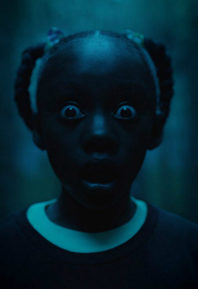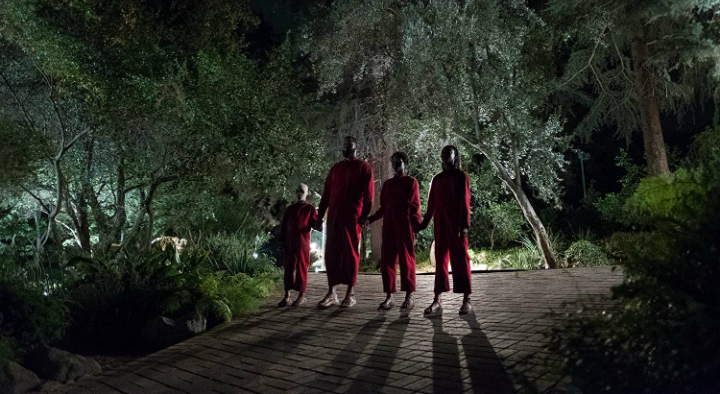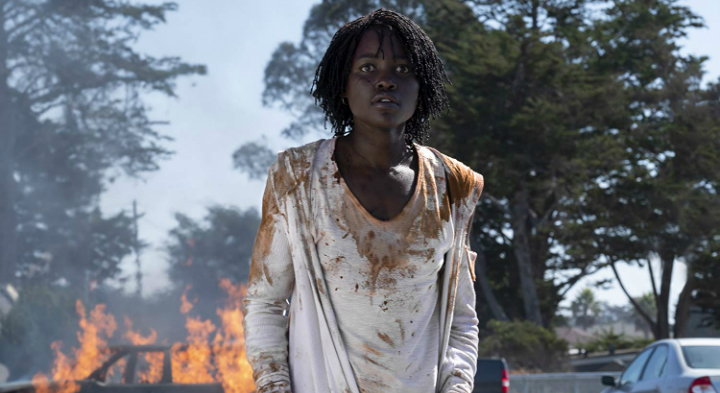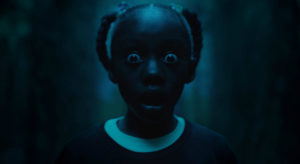
If this world were fair, we would judge films on their own merits. Budgets, box office performance, and streaming versus theatrical debates wouldn’t factor into the conversation. But a just world wouldn’t give birth to a filmmaker like Jordan Peele; a man who based his career on calling out racial inequalities. His debut feature, Get Out ascended into rarefied air. It’s a critical darling, box office success, and pop culture phenomenon, the likes of which come around once every decade. His latest picture, Us, faces impossible expectations. But what does impossible even mean to a mind wired to manifest nightmares like the sunken place?
Us is a tough film to explain. Period. And doing so without getting into spoiler territory isn’t easy. But here goes…
It’s 1986, and a young girl named Adelaide (Madison Curry) is enjoying a night at the fair with her parents. Her dad has a few too many beers, bickers with her mom, and Adelaide slips off into the dark California night. As rainclouds swirl overhead, she seeks refuge in a house of mirrors. And in a chilling shot, Adelaide sees a mirror image with its back turned to her, only to realize it’s no reflection; it’s a living, breathing doppelganger.
Flashforward 30 years and Adelaide (Lupita Nyong’o) is alive and well. We’re reintroduced to her while she’s on vacation and making her way to her summer home in Santa Cruz – the place where the strange incident happened. She’s a family woman now, happily married to her husband Gabe Wilson (Winston Duke) and parent to teenage daughter Zora (Shahadi Wright Joseph) and son Jason (Evan Alex), a young magic enthusiast.
Adelaide’s life looks perfect, but there’s trouble below the surface. She still suffers the aftershocks of her childhood trauma. Being so close to the scene of the incident leaves her on edge. Odd occurrences start piling up, and she’s troubled by too many weird coincidences. And right on queue, under cover of night, her doppelganger returns. But she’s not alone. She arrives in Adelaide’s driveway, flanked by spitting images of Gabe, Zora, and Jason. Calling themselves the tethered, the foursome breaks into the Wilson’s home and take them captive. To share anymore would spoil the fun.
Call Us a horror movie. Call Us a thriller. You can even call the film sci-fi. But this movie works because it’s grounded by fully-realized human characters. Peele dedicates ample time to fleshing out the Wilson’s as individuals and as a family unit. They quip, banter, and push each other’s buttons, and their love for one another is palpable. Peele is too invested in making grand social statements to populate his film with one-dimensional characters.
Peele ensures the audience falls for the Wilsons during the first act. And the effect is two-fold. Watching them co-exist is sitcom-level funny – it’s here where Peele’s comedy chops come into play. But since the Wilsons are people and not props, it raises the movie’s emotional stakes. Once you care about the Wilsons you’ve got skin in the game and enduring their fight to survive becomes gruelling.
Everyone in the cast turns in a pitch-perfect performance. Even the Wilson’s neighbours, the Tyler family receive a moment to shine. At first glance, they come across like comic relief. As Kitty Tyler, Elisabeth Moss is like a basketball player who checks into the game and just starts dunking on everybody. But the Tylers serve as inverse doppelgangers; a family of four with a level of affluence that the Wilson’s aspire to. Peele juxtaposes these three families to comment on class, affluence, and our toxic aspirational drive.
Winston Duke’s Gabe is an extraordinary cornball, and the reason society invented the term dad joke. Working off of Peele’s script, Duke is a comedic marvel. But most impressive is how he tees up Nyong’o to carry the film’s emotional and physical load. Adelaide is this movie’s Ellen Ripley. And being the family badass looks more impressive when protecting a man with biceps the size of her waist. Gabe is brave in the face of his natural cowardice, but Adelaide is a stone-cold killer.
This film belongs to Nyong’o. And if this world were fair, she would be an award season lock. But we live in a world where Glenn Close wins award after award for a dusty-ass chamber piece like The Wife, while Toni Collette’s masterful performance in Hereditary goes ignored. Films scare us the most, not by showing us the beast lurking in the shadows, but by focusing on the terror etched on their prey’s face. As the trailers for Us proudly show off, no one does terrified like Nyong’o.
What’s most extraordinary is that she’s pulling off double duty. Her doppelganger, Red, is a hideous manifestation ripped straight out of a fever dream. She skitters and darks around the frame like an insect, speaks as though her throat is filled with sand, and has a gaze that looks right through you. Nyong’o’s performance will fuel nightmares for decades to come. It’s a flashy turn, but it’s filled with nuance, and heavily considers and then reflects the film’s core themes. It’s impossible to fully appreciate what Nyong’o is executing in just one viewing.
There are big idea filmmakers, guys like Darren Aronofsky who are fascinating directors with much to say. But their opaque themes and dense narratives lose viewers. And decoding their texts often feels like homework. Then there are flashy directors like Zack Snyder and Robert Rodriguez, men who splash vivid imagery across the screen as their core themes fail to leave lasting impressions. The filmmakers that stand the test of time; Scorsese, Kubrick, and most recently Coogler, combine the sizzle with the steak. With two films under his belt, Peele is proving to be one such filmmaker.
Peele doesn’t need Marvel movie-calibre budgets to load his pictures with knockout visuals. He packs his films with iconography that will stand the test of time. Images of Chris dropping into the sunken place and Missy stirring the teacup have seared themselves into our collective consciousness. Here, Peele leans on his cinematographer Mike Gioulakis (It Follows) to produce powerful, soul-rocking images.
The cinematography in Us turns the movie into a living, breathing nightmare. Gioulakis finds the most sinister ways to drape the tethered in shadows. And the way his camera leers down perilous corridors will send icicles shooting down your spine. One impressive shot sees Adelaide and Red sharing the camera’s focus in a De Palma-esque split diopter shot. What’s most impressive is that the tricky maneuver isn’t all for show. This logistically challenging shot – which sees both women in focus at varying distances from the camera – is also narratively revealing. You may not understand the choices Peele makes, but you absorb them none the less.
Peele enjoys subverting expectations. Right when we expected him to zig, he zagged. Us isn’t a commentary on being black. The Wilsons just so happen to be black. But you could swap them out for Asians, Latinos, or white Americans. They’re not under assault because of their blackness. Us is less about race than class. But Peele still addresses race from a distance. It’s no coincidence that trouble kicks off at a beach, a space that wasn’t historically open to black families. We’ve all heard the jokes about black people and swimming.
Peele tackles heady issues with the fury of a filmmaker afraid they won’t make another movie. He addresses class warfare, oppression, being othered, self-denial, accountability, and living with a fractured sense of self. And at times it appears every wardrobe choice and aspect of production design carries a hidden meaning.
Early on we see a TV set flanked by VHS tapes of The Goonies and C.H.U.D. – movies that deal with going underground. And young Adelaide wins a Michael Jackson Thriller t-shirt which comes loaded with red flags. And what does it say about America that a mild-mannered family like the Wilsons easily adjust to racking up a crazy body count? Many of the movie’s themes are sturdy enough to support their own film and unpacking them in one sitting is a daunting task. Though I have no doubt that many will be up for it.
Us is a terrifying thriller that is wickedly funny and jam-packed with striking visuals. Peele spends the first act building tension before something finally gives, and the frights come cascading at you. The scares don’t reach the fever pitch of the best horror flicks, but they happen often, and Peele executes them with a level of artistry and technical mastery that will leave you gasping.
- Release Date: 3/22/2019




